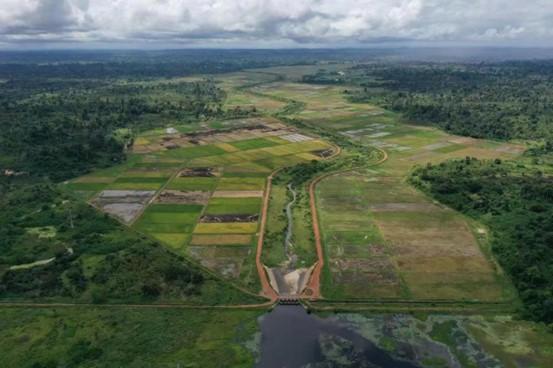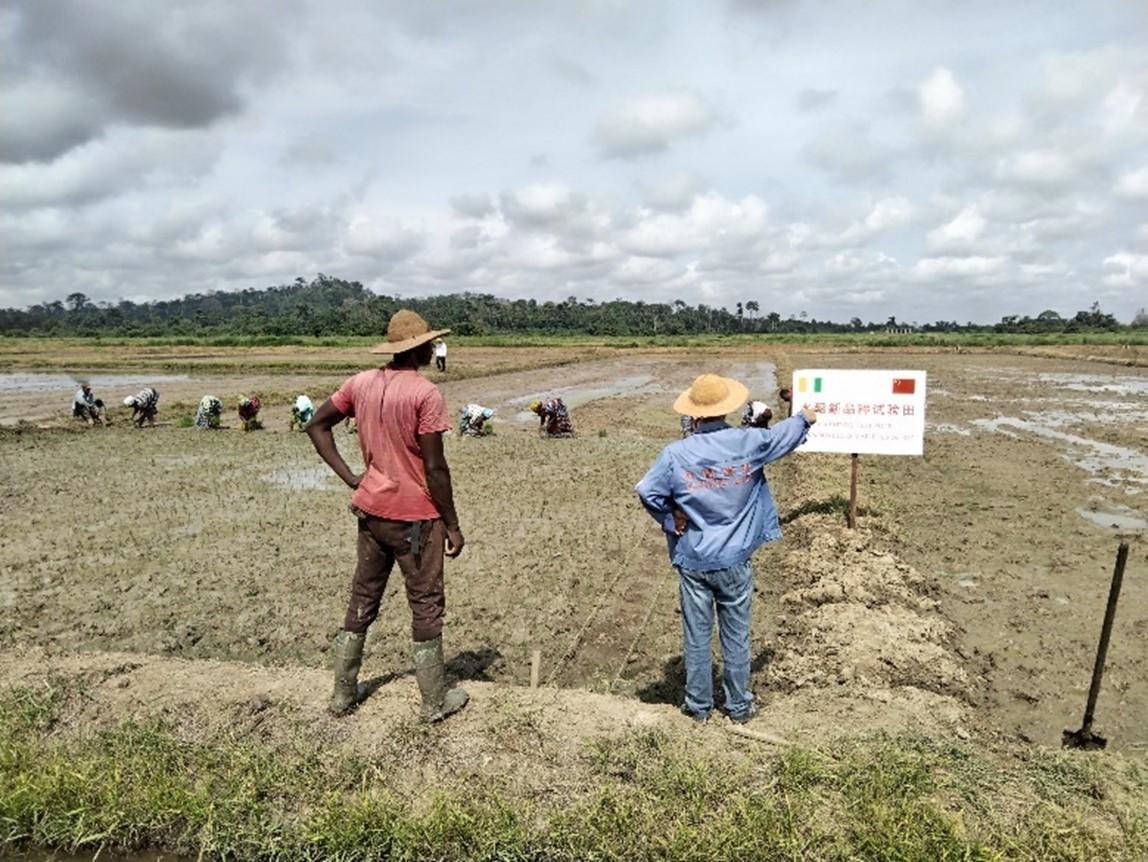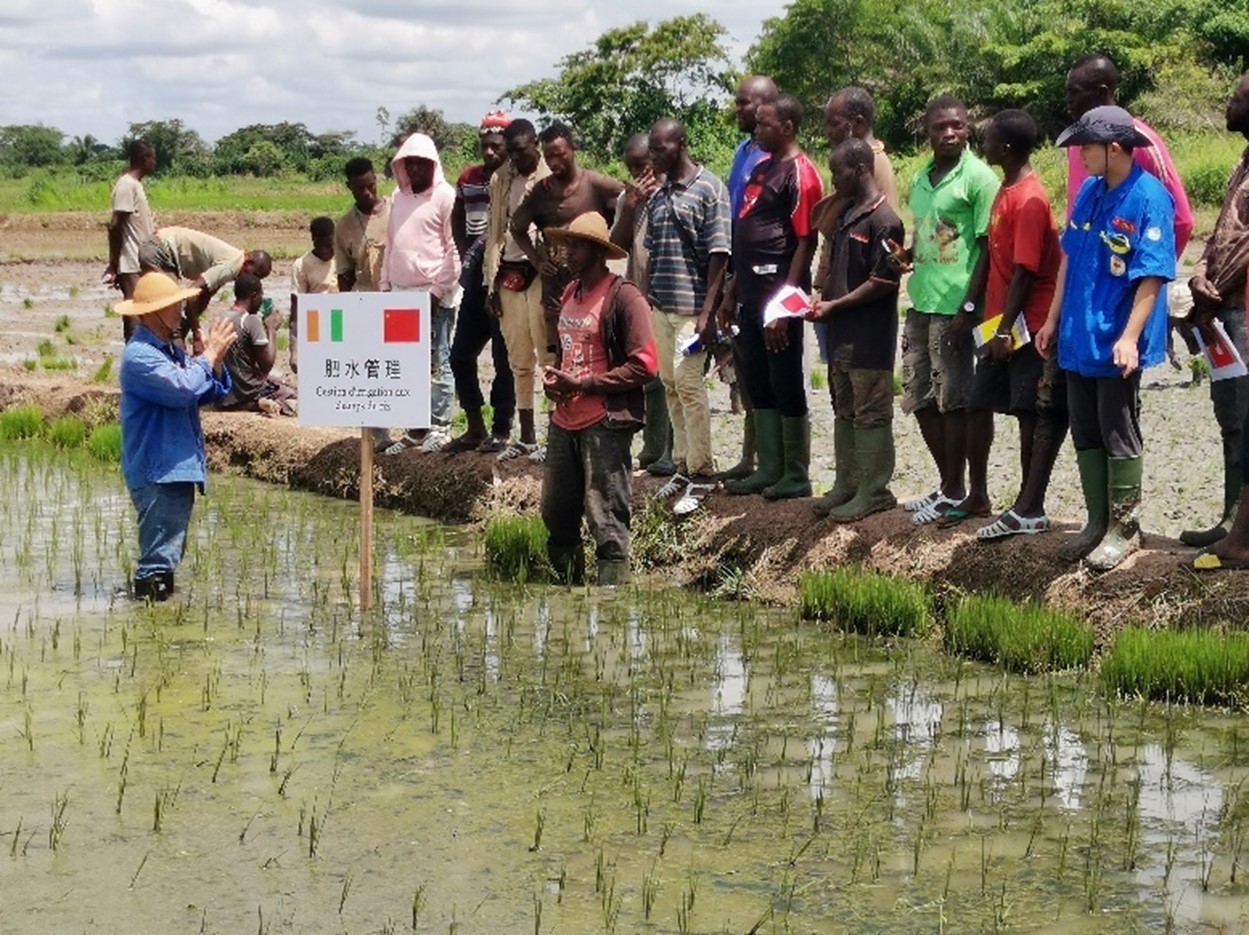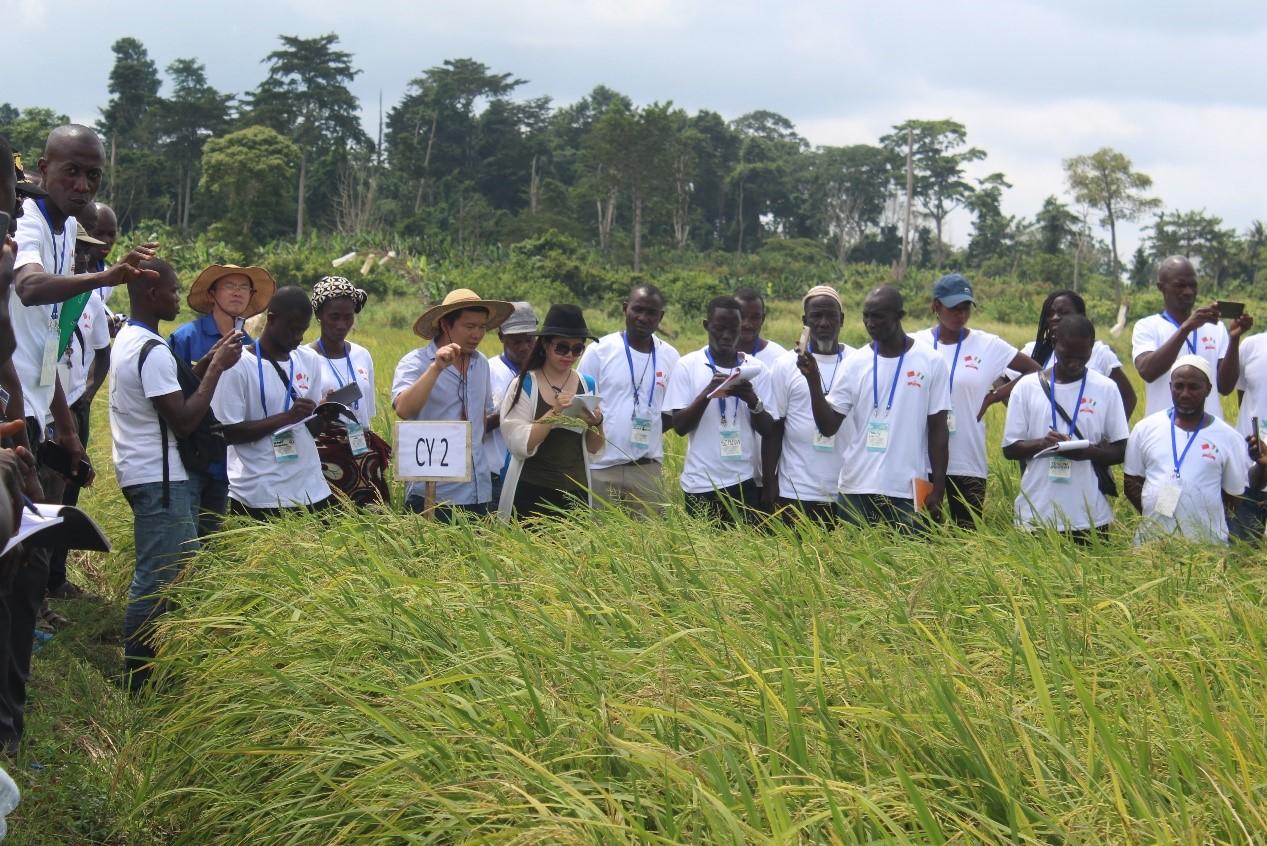
A view of a rice reclamation area located in Guiguidou Village, Divo Department, Côte d'Ivoire, that is supported by China known as the Guiguidou agricultural demonstration centre
Côte d'Ivoire imported the third most rice of any nation in Africa until 2012 because its production only covered 40% to 60% of demand prior to that year, according to an FAO agricultural development economics technical study released in 2020. The rice that was grown could only be harvested once per year in 2013, and the dominant rain-fed rice production that occurred in the country resulted in average yields of 1.5 tonnes per ha. Specially selected seedlings being used in only 7% of the cultivation area, very low herbicide and fertiliser usage, the entirety of production operations being conducted by hand, and other factors limited output and resulted in approximately USD480 million being spent on importing rice per year.
China has been providing Côte d'Ivoire with agricultural support since the 1980s. A rice farming project that was implemented in Guiguidou Village, Divo Department, some 180 km from Abidjan, the country's capital city, in 1995 is one of the cooperative Sino-Ivorian endeavours that has been pursued in this area.
After several tests were conducted, the Chinese technical team began introducing strains of rice that are better suited to the local environment and teaching Guiguidou's farmers fertilisation methods and irrigation knowledge, including irrigation system rehabilitation approaches and concepts; integrated pest and disease control techniques; high-quality seed cultivation and selection methods; operation procedures related to rice transplanters, tractors, tillers, harvesters, threshers, seed selection machines, and other machinery; and other skills, techniques, and information in conjunction with the National Office for Rice Farming Development and local agricultural councils in order to help them improve the quality of their crops and increase their yields. A variety of black rice that filled a gap in the local market and three other new varieties of rice that were approved have been promoted in various rice growing regions across Côte d’Ivoire and were being cultivated on over 20,000 ha of land as of the summer of 2023.

A beneficiary of a rice farming project that was implemented in Guiguidou in 1995 with the support of China named Benjamin (left) helps a Chinese agricultural expert demonstrate rice farming techniques in the village.
A beneficiary of the project named Benjamin has been working as an assistant for the Chinese technical team in Guiguidou for more than 20 years. Born into a large family in Burkina Faso, which is located to the northeast of Côte d'Ivoire, he travelled to Divo Department with his uncle in the 1990s in hopes of finding more opportunities when he was 14 years old. With few skills and little formal education, Benjamin decided to pursue farming. He eventually leased a plot of land and began generating XOF200,000 a year selling the crops he grew. The immigrant could hardly make ends meet on this sum, however, and sometimes relied on contributions from relatives.
Things began to change when Benjamin encountered a group of Chinese people for the first time in his life. The group consisted of agricultural experts who were growing different varieties of rice and using different methods than those he was familiar with. They transplanted the strong, healthy seedlings that emerged from seed that had been planted in flat seedbeds to larger areas of land while locals sowed seed directly in fields, among other special measures.
Astonished by the higher yields that the Chinese experts were obtaining, Benjamin eagerly registered for a training course that they offered and participated in all of the subsequent courses that they made available. He was also among the first to enrol when the Chinese team was looking for demonstration households to promote new rice varieties that sell for one-third more than local varieties. His annual income soared from XOF200,000 to XOF500,000 the first year he grew the new rice varieties and implemented corresponding cultivation techniques. After fully mastering all of the techniques that the Chinese experts shared, Benjamin began generating more revenue from one hectare of land than other farmers did from two. More people started getting involved when they saw the success that he was having, which made it possible for the average annual incomes of those who participated in a local rice reclamation area to rise to XOF1.5 million. Benjamin also oversees the production of nearly 50 tonnes of improved seed – a task that involves more than 30 growers – every season, which enables participants to generate over 30% more income than farming rice intended to be consumed as food. The main rice cultivation season in Côte d’Ivoire runs from around July to December, and a second can begin in January or February if land is properly irrigated. Benjamin now generates XOF3 million of income per year from rice cultivation alone, and he continues to expand his farm, grow new varieties, and implement new techniques. The industrious man was able to begin engaging in cacao farming after buying 10 more ha of land as well and built a house in Divo City, which is the seat of Divo Department and a good place for his children to study.

Benjamin (standing in the water with the red shirt) assists Chinese agricultural experts with fertiliser and water management training.
Sincere, loyal, and studious, Benjamin also learnt Mandarin Chinese from the Chinese experts in addition to various rice cultivation techniques and ended up being the only person in Guiguidou who could communicate with them. He began assisting the experts, engaging in translation, and helping more than 20 demonstration households localise new varieties and promote advanced rice cultivation techniques and new certified varieties to villagers that live near Guiguidou.
The now locally prominent farmer invited his younger brother, who had recently reached adulthood and was still living in their hometown, to come to Guiguidou in hopes that he would learn from the Chinese experts like he did, and he accepted his invitation. Benjamin even built his brother a house and helped him turn it into a home, which helped make it possible for him to eventually get married.

Chinese agricultural experts introduce Chinese rice varieties to trainees in Côte d'Ivoire.
These kinds of stories are common in Guiguidou. A native of the nation of Mali, which borders Côte d'Ivoire to the north, named Madou fled to the village in order to escape the warfare present in his home country. The immigrant had no land or fixed place to live in Guiguidou and found it difficult to find a job. He participated in a technical training course covering agricultural machinery offered by Chinese experts that he found out about by chance, however, and expressed a desire to become an agricultural machinery operator. Madou gained the ability to skilfully operate tractors, rotary tillers, rice transplanters, harvesters, and other agricultural machinery and also mastered various maintenance skills and techniques. He has become well-known for his farming expertise in the local area and has taught what he has learnt to more than 10 other farmers. The formerly impoverished man is now married, has a family, and leads a happy life in Guiguidou.
Country: Côte d'Ivoire
Partner: Liaoning International Cooperation Group
Category
Chinese Experts Introduce Rice Cultivation Techniques in Côte d’Ivoire
Contributor
Chinese Experts Introduce Rice Cultivation Techniques in Côte d’Ivoire
Country
Story

